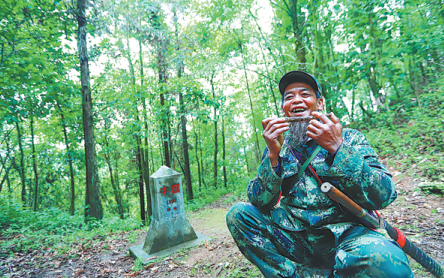Keeping border safe in Yunnan a family tradition

From the looks of his skin, Yan Cong spends a lot of time outdoors exposed to the sun, wind and rain.
Dressed in a dark green camouflage coat and carrying a crescent-shaped knife, Yan and his colleagues patrol a 7-kilometer section of China's border with Myanmar some 350 days a year.
In the past five decades, he has walked more than 100,000 km. Officers come and go, but Yan has stuck with his job protecting his hometown.
"The border patrols have changed several times, but Yan Cong is still here, offering guidance and information to new police officers," said Duan Yuanbin, a border policeman who has worked with Yan for two decades.
Born in 1960 and raised in Ximeng county, Yunnan province, Yan said drug dealers and smugglers crossed the border frequently when he was a child. He felt a sense of urgency to protect the border and his village. "We needed to do something to let the smugglers know there were people patrolling, and they could be caught," he said.
His father was among the first to patrol the border following the founding of the People's Republic of China in 1949. He taught his son and later his grandson that protecting the country was an important part of guarding their home. The Va ethnic group elder is the head of a village in Ximeng.
Over time, patrolling the border has become a family tradition, and the boundary markers along the border their family treasures. On a China Central Television show about youth shaping the future, Yan Hu, Yan Cong's son, shared the family story of guarding the border over the past 56 years.
It is not easy, he said. There are no roads, and sometimes there are dangerous animals in the forest.
"Thorns and weeds grow rampant along the trail if you don't walk it frequently. A guide is necessary for those not familiar with the route," Yan Hu said.
When he was 10, Yan Cong started patrolling the border on his own.
One dark night when Yan Cong tried to clear the trail of thorns in the rain, he accidentally cut his own leg. It aches sometimes, even now, because it took time for him to get treatment. However, he has no regrets.
"The first time I patrolled the border with my father and the border police officers when I was 6, I complained that the trail was very long. Dad told me that it was endless and encouraged me to keep going," Yan Hu said.
A one-way journey takes around six hours. When the men get hungry, they eat compressed biscuits, and they play instruments and listen to music while taking a break.
"When we pass the stone boundary markers, my father always asks me to touch them. When I do, it's like I can feel his efforts and those of my grandfather, and their devotion," Yan Hu said.
In 1993, Yan Cong saw the installation of boundary markers No 180 and No 181.
On patrols, he often tells the history of each boundary marker to the other officers and stresses the importance of guarding the border to younger members.
"In my eyes, my father and grandfather are both ordinary people but also heroes," Yan Hu said. "I will carry on the mission and patrol the border with my father."
Contact the writers at yezizhen@chinadaily.com.cn























